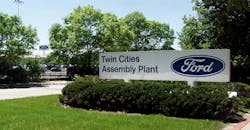NIMBYism, generational divide threaten plan for net-zero village in St. Paul, Minn.
Plans for an ambitious net-zero village on the site of the former Ford Twin Cities Assembly Plant in St. Paul, Minn., have generated extensive support among environmentalists.
The development would become one of the first net-zero energy communities in America, with all the power consumed generated from renewable sources on site. The neighborhood would use one of the first aquifer thermal energy storage systems in the U.S., which would pump groundwater from aquifers to heat and cool buildings.
Opposition from a group organized by neighbors in the adjoining Highland Park village of mostly single-family homes is centered on concerns over traffic, a change to the neighborhood’s character, and the threat of environmental pollution at a nearby dump site. A rival grassroots group emerged last summer to support the plan.
The debate often broke along generational lines, with older people opposed to the project and younger people interested in living there. The city council has voted to reduce height limits for new residential construction from 10 stories to six.
